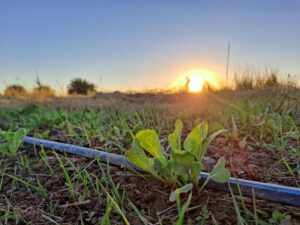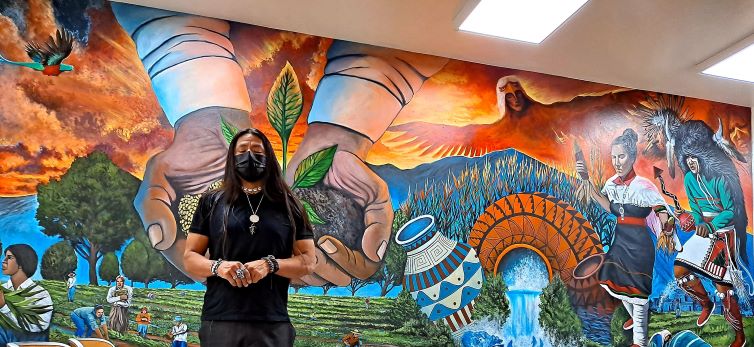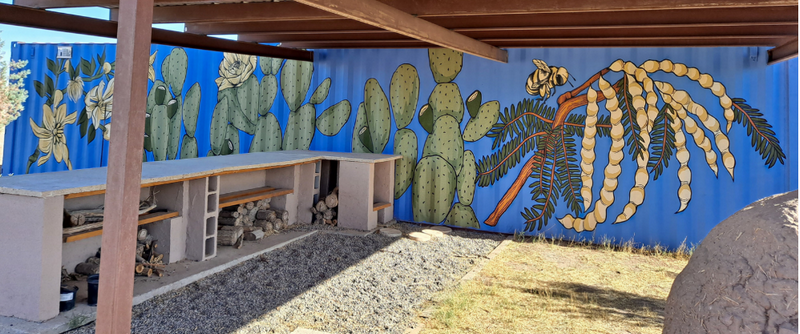Snapshots of Resilience: Tending Land, Sharing Traditions, and Feeding Our Families Before and Amidst COVID-19 Disruptions
Michelle E. Carreon, Food Justice Storyteller
This month marked the 2-year anniversary of the pandemic lockdown in the Paso del Norte region. Among other things at that time, we had been getting ready to host two community listening sessions to learn how people access food, grow food, and share food traditions with their families. We wanted to understand past and present foodways stories, to learn from each other about the challenges we face and the strategies we employ to keep local foodways vibrant. Like so many other events, these plans were quickly canceled when the City and County of El paso declared a state of emergency in mid-March. As an organization, La Semilla promptly strategized and adapted in many ways–from ensuring all staff could remain employed and work remotely to our Farm Fresh and Community Farm programs working together to provide accessible and healthy produce for our community via a new farm box program and donations to local organizations.
There is no doubt that COVID-19 ushered in a time of unprecedented uncertainty and loss that continues to impact our region today. In those first months, our communities experienced increasing numbers of reported cases and deaths, severe strain on health workers and institutions, economic devastation as folks were laid off and furloughed from their jobs, and increased food shortages and insecurity. This global pandemic did not create these challenges and systems of inequity, but it certainly exacerbated them and has revealed the ongoing need to transform these systems and share how our community has not only responded but has been resilient and creative beyond measure for generations.
 Image Credit: Michelle Carreon
Image Credit: Michelle Carreon
Folks in our region have demonstrated resilience, creativity through adaptation, and a true sense of community. Our community exemplified wisdom, interconnectedness, and care for each other from the ground-up. As people deeply connected to land and culture, we have a responsibility to integrate past and present foodways stories in our region that can inform our collective movement forward. By the time we regrouped and transitioned to virtual story-gathering sessions in October of 2020, we had a new layer to discuss: How did disruptions caused by the COVID-19 pandemic impact local foodways?
We held two story-gathering sessions in October of 2020–one in English and one in Spanish. We gathered virtually with dozens of folks from Las Cruces, NM to El Paso, TX, including the small and rural towns in between. They included farmers, backyard gardeners, food producers, chefs, restaurant workers, teachers, and artists. These sessions offered an opportunity for connection during a moment of increased disconnection and isolation, as well as an opportunity to capture and document this moment and the lived experiences of our community.
After analyzing session notes and transcriptions and identifying the most salient and impactful themes from these conversations, we are now sharing what we heard and learned with the public in a full report. This report serves as both a snapshot and contribution to local history, as well as a testament to the resilience and creativity of our community. The threads that emerged from these dialogues epitomize an undeterred resilience, creative adaptation, and enduring cultural identity in the face of multiple, overlapping challenges–both historical and emerging.
We learned about folks’ challenges regarding land and water access, climate change impact, and foodways education and practice, while being reminded of the significant impact of an over reliance on an industrial food system that profits from the exploitation of people and the environment and causes detrimental effects on community health. COVID-19 impacts were reflected in conversations about food scarcity, impacts on school food programs and access, worsening economic insecurity, mental health consequences, and seed and plant shortages and water issues that exacerbated gardening challenges. Seeing some “silver lining” during these early months of the pandemic, participants also shared an opportunity to “reset” and reconnect with the land and with each other. Intergenerational connections were strengthened, as well as remembrances of cultural traditions and communal experiences. All of this reminds us of the importance of robust and equitable local foodways that are grounded in: community-informed food policies and programs, desert-adapted and hands-on farming education, and community-rooted foodways narratives.
The stories gathered in the fall of 2020 inspired two murals in the region by El Paso-based artists. “Life Origins” by Diné artist Al Woody is featured at Bowie High School where students can learn about local foodways through beautiful imagery.
 Image Credit: Michelle Carreon
Image Credit: Michelle Carreon
“Long Roots, Long Lives” by Christin Apodaca serves as a meaningful backdrop at La Semilla Community Farm during educational and cultural programs. Both artists were present during the sessions and influenced by the stories shared.

Image Credit: Michelle Carreon
We invite you to read the full report, see the powerful quotes from our community members, and share with others to increase the visibility of the wisdom and resiliency we possess and practice as a region. You can also watch a short documentary, created by local filmmaker Viridiana Villa, reflecting these stories and highlighting the two murals influenced by our community’s experiences and wisdom at our YouTube channel. We continue to forge new ways to adapt to these circumstances through creativity and by deepening relationships with each other and with the land/desert ecosystem.


